Microeconomics Assignment: Exploring Economic Principles and Trade
VerifiedAdded on 2023/01/16
|6
|882
|83
Homework Assignment
AI Summary
This assignment provides an overview of key microeconomic principles. It discusses how people make decisions, the concept of opportunity cost, and the importance of thinking at the margin. It explores how trade benefits everyone, the efficiency of markets, and the role of government in addressing market failures. The assignment also covers the relationship between a nation's living standards and its ability to produce goods, the impact of money printing on inflation, and the short-term trade-off between unemployment and inflation. Furthermore, it explains the law of comparative advantage using the example of Michael Jordan and his neighbor, illustrating how both parties can benefit from trade based on their skills and opportunity costs. The assignment uses references to support the concepts discussed.
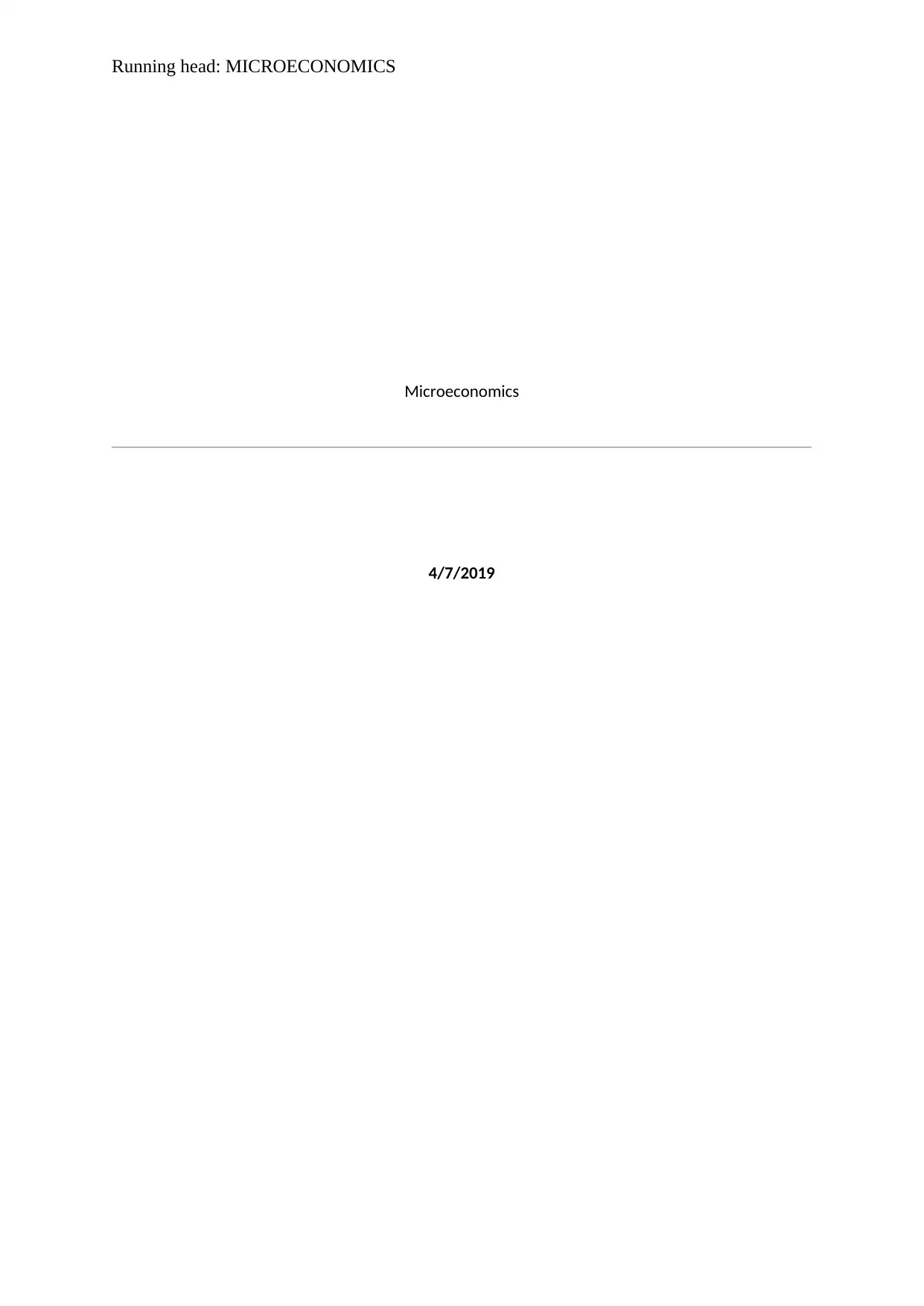
Running head: MICROECONOMICS
Microeconomics
4/7/2019
Microeconomics
4/7/2019
Paraphrase This Document
Need a fresh take? Get an instant paraphrase of this document with our AI Paraphraser
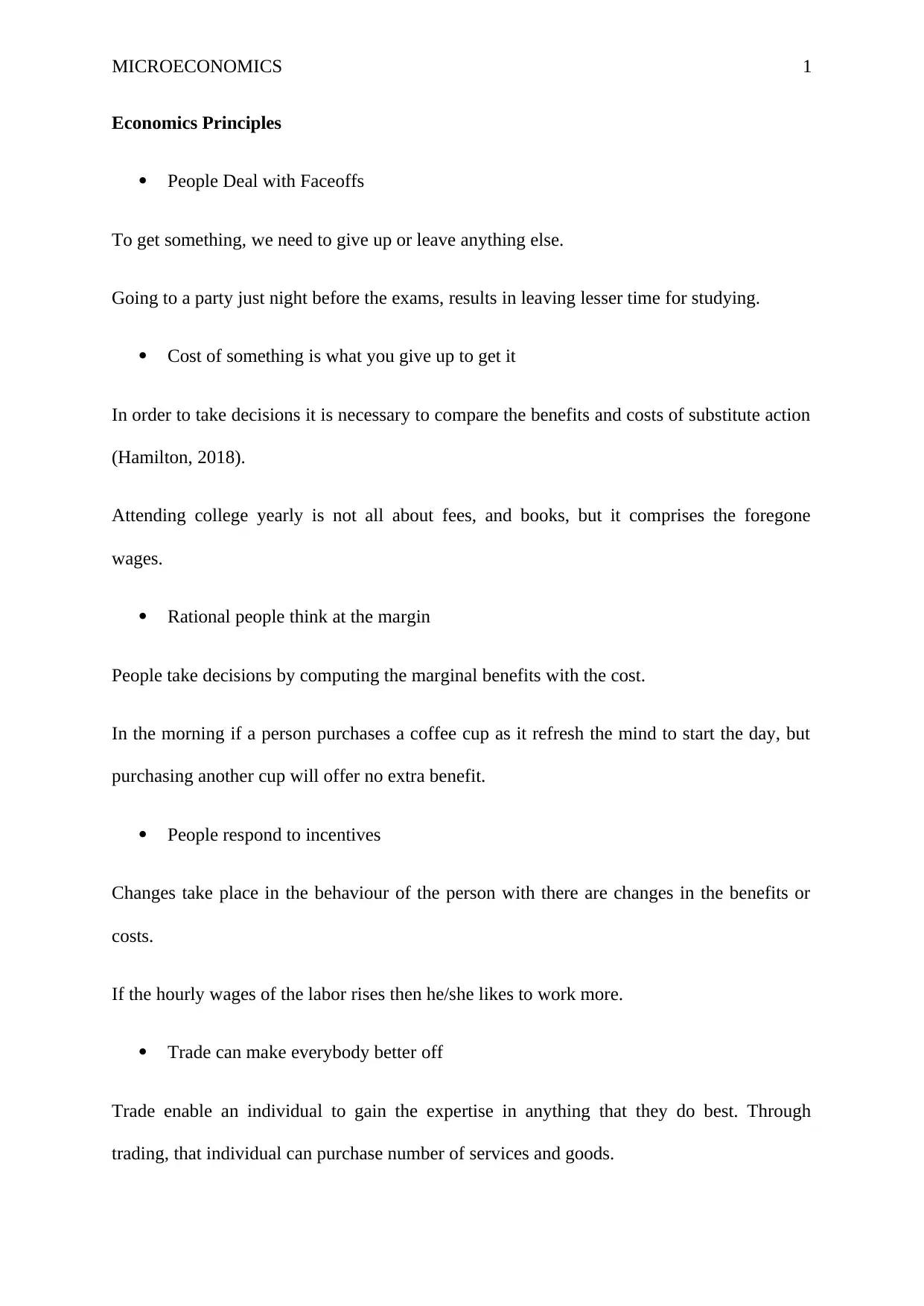
MICROECONOMICS 1
Economics Principles
People Deal with Faceoffs
To get something, we need to give up or leave anything else.
Going to a party just night before the exams, results in leaving lesser time for studying.
Cost of something is what you give up to get it
In order to take decisions it is necessary to compare the benefits and costs of substitute action
(Hamilton, 2018).
Attending college yearly is not all about fees, and books, but it comprises the foregone
wages.
Rational people think at the margin
People take decisions by computing the marginal benefits with the cost.
In the morning if a person purchases a coffee cup as it refresh the mind to start the day, but
purchasing another cup will offer no extra benefit.
People respond to incentives
Changes take place in the behaviour of the person with there are changes in the benefits or
costs.
If the hourly wages of the labor rises then he/she likes to work more.
Trade can make everybody better off
Trade enable an individual to gain the expertise in anything that they do best. Through
trading, that individual can purchase number of services and goods.
Economics Principles
People Deal with Faceoffs
To get something, we need to give up or leave anything else.
Going to a party just night before the exams, results in leaving lesser time for studying.
Cost of something is what you give up to get it
In order to take decisions it is necessary to compare the benefits and costs of substitute action
(Hamilton, 2018).
Attending college yearly is not all about fees, and books, but it comprises the foregone
wages.
Rational people think at the margin
People take decisions by computing the marginal benefits with the cost.
In the morning if a person purchases a coffee cup as it refresh the mind to start the day, but
purchasing another cup will offer no extra benefit.
People respond to incentives
Changes take place in the behaviour of the person with there are changes in the benefits or
costs.
If the hourly wages of the labor rises then he/she likes to work more.
Trade can make everybody better off
Trade enable an individual to gain the expertise in anything that they do best. Through
trading, that individual can purchase number of services and goods.
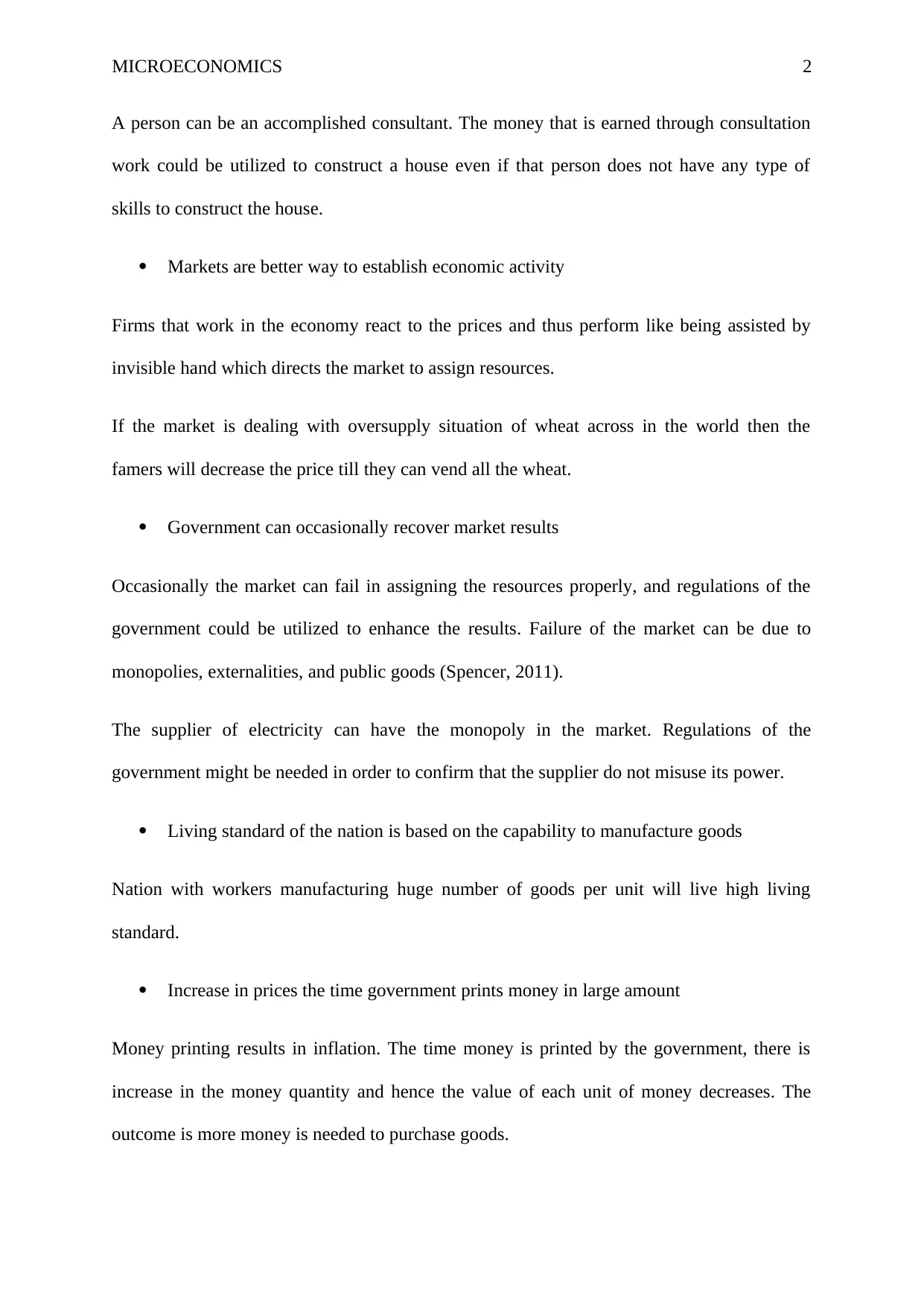
MICROECONOMICS 2
A person can be an accomplished consultant. The money that is earned through consultation
work could be utilized to construct a house even if that person does not have any type of
skills to construct the house.
Markets are better way to establish economic activity
Firms that work in the economy react to the prices and thus perform like being assisted by
invisible hand which directs the market to assign resources.
If the market is dealing with oversupply situation of wheat across in the world then the
famers will decrease the price till they can vend all the wheat.
Government can occasionally recover market results
Occasionally the market can fail in assigning the resources properly, and regulations of the
government could be utilized to enhance the results. Failure of the market can be due to
monopolies, externalities, and public goods (Spencer, 2011).
The supplier of electricity can have the monopoly in the market. Regulations of the
government might be needed in order to confirm that the supplier do not misuse its power.
Living standard of the nation is based on the capability to manufacture goods
Nation with workers manufacturing huge number of goods per unit will live high living
standard.
Increase in prices the time government prints money in large amount
Money printing results in inflation. The time money is printed by the government, there is
increase in the money quantity and hence the value of each unit of money decreases. The
outcome is more money is needed to purchase goods.
A person can be an accomplished consultant. The money that is earned through consultation
work could be utilized to construct a house even if that person does not have any type of
skills to construct the house.
Markets are better way to establish economic activity
Firms that work in the economy react to the prices and thus perform like being assisted by
invisible hand which directs the market to assign resources.
If the market is dealing with oversupply situation of wheat across in the world then the
famers will decrease the price till they can vend all the wheat.
Government can occasionally recover market results
Occasionally the market can fail in assigning the resources properly, and regulations of the
government could be utilized to enhance the results. Failure of the market can be due to
monopolies, externalities, and public goods (Spencer, 2011).
The supplier of electricity can have the monopoly in the market. Regulations of the
government might be needed in order to confirm that the supplier do not misuse its power.
Living standard of the nation is based on the capability to manufacture goods
Nation with workers manufacturing huge number of goods per unit will live high living
standard.
Increase in prices the time government prints money in large amount
Money printing results in inflation. The time money is printed by the government, there is
increase in the money quantity and hence the value of each unit of money decreases. The
outcome is more money is needed to purchase goods.
⊘ This is a preview!⊘
Do you want full access?
Subscribe today to unlock all pages.

Trusted by 1+ million students worldwide
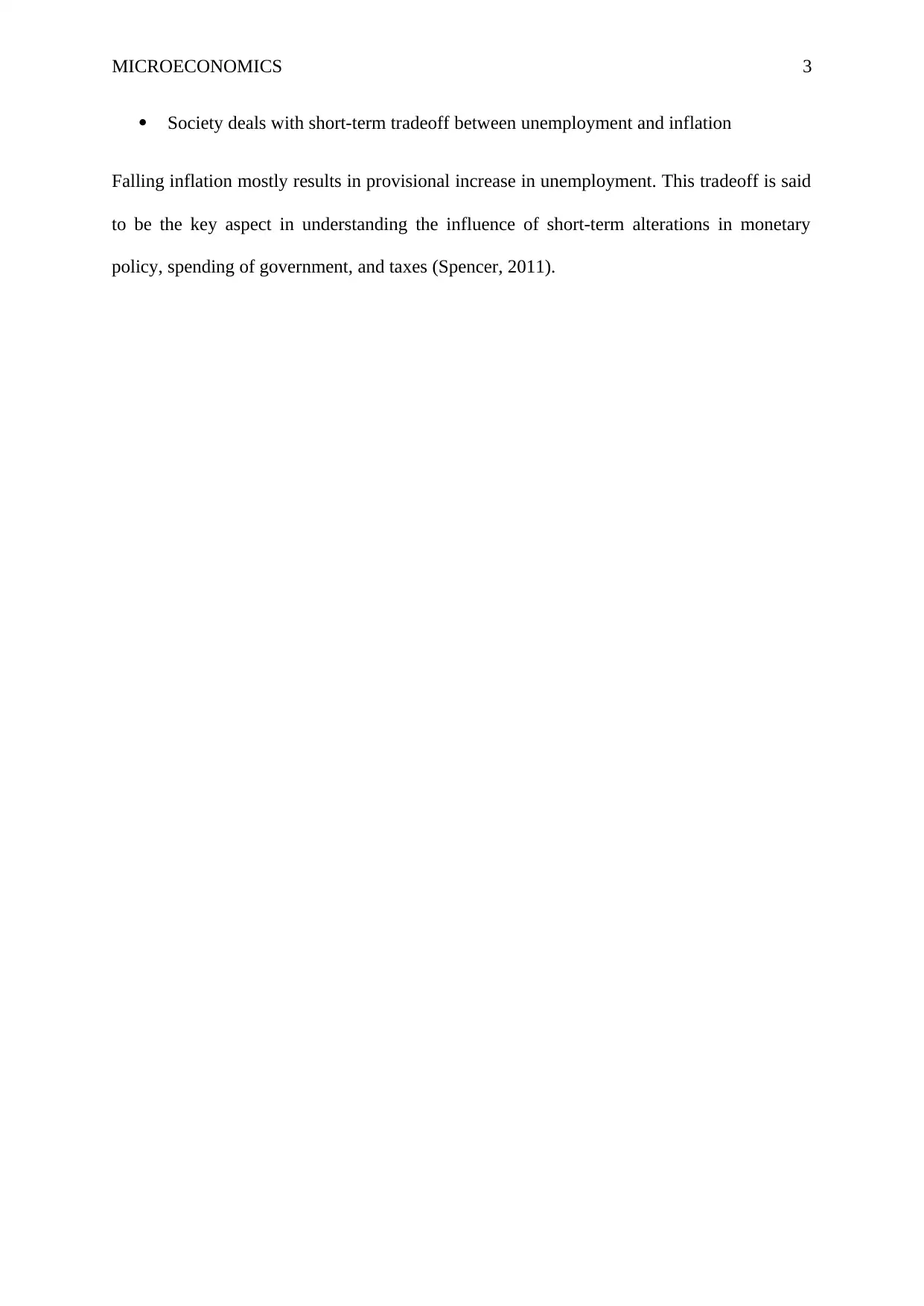
MICROECONOMICS 3
Society deals with short-term tradeoff between unemployment and inflation
Falling inflation mostly results in provisional increase in unemployment. This tradeoff is said
to be the key aspect in understanding the influence of short-term alterations in monetary
policy, spending of government, and taxes (Spencer, 2011).
Society deals with short-term tradeoff between unemployment and inflation
Falling inflation mostly results in provisional increase in unemployment. This tradeoff is said
to be the key aspect in understanding the influence of short-term alterations in monetary
policy, spending of government, and taxes (Spencer, 2011).
Paraphrase This Document
Need a fresh take? Get an instant paraphrase of this document with our AI Paraphraser
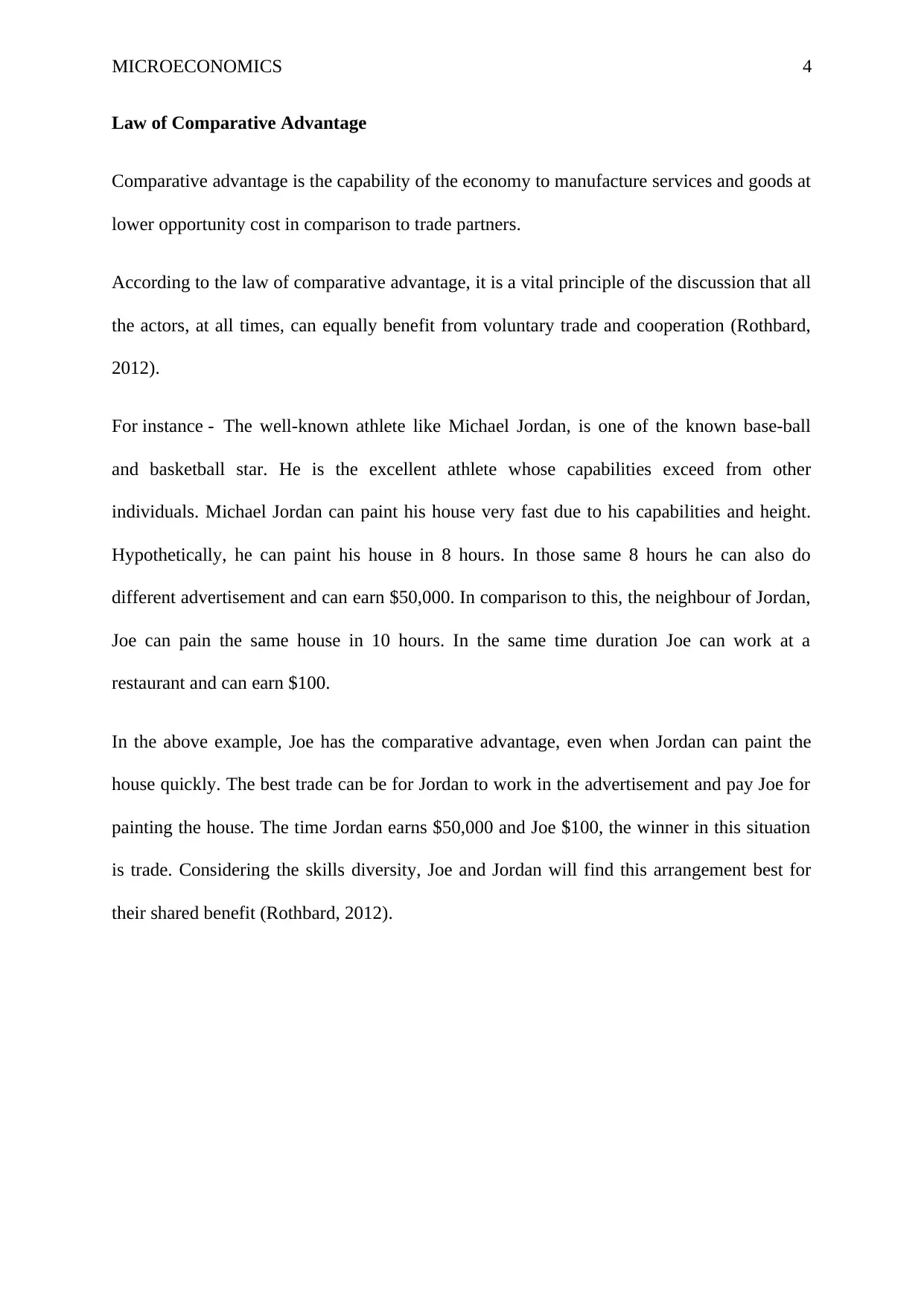
MICROECONOMICS 4
Law of Comparative Advantage
Comparative advantage is the capability of the economy to manufacture services and goods at
lower opportunity cost in comparison to trade partners.
According to the law of comparative advantage, it is a vital principle of the discussion that all
the actors, at all times, can equally benefit from voluntary trade and cooperation (Rothbard,
2012).
For instance - The well-known athlete like Michael Jordan, is one of the known base-ball
and basketball star. He is the excellent athlete whose capabilities exceed from other
individuals. Michael Jordan can paint his house very fast due to his capabilities and height.
Hypothetically, he can paint his house in 8 hours. In those same 8 hours he can also do
different advertisement and can earn $50,000. In comparison to this, the neighbour of Jordan,
Joe can pain the same house in 10 hours. In the same time duration Joe can work at a
restaurant and can earn $100.
In the above example, Joe has the comparative advantage, even when Jordan can paint the
house quickly. The best trade can be for Jordan to work in the advertisement and pay Joe for
painting the house. The time Jordan earns $50,000 and Joe $100, the winner in this situation
is trade. Considering the skills diversity, Joe and Jordan will find this arrangement best for
their shared benefit (Rothbard, 2012).
Law of Comparative Advantage
Comparative advantage is the capability of the economy to manufacture services and goods at
lower opportunity cost in comparison to trade partners.
According to the law of comparative advantage, it is a vital principle of the discussion that all
the actors, at all times, can equally benefit from voluntary trade and cooperation (Rothbard,
2012).
For instance - The well-known athlete like Michael Jordan, is one of the known base-ball
and basketball star. He is the excellent athlete whose capabilities exceed from other
individuals. Michael Jordan can paint his house very fast due to his capabilities and height.
Hypothetically, he can paint his house in 8 hours. In those same 8 hours he can also do
different advertisement and can earn $50,000. In comparison to this, the neighbour of Jordan,
Joe can pain the same house in 10 hours. In the same time duration Joe can work at a
restaurant and can earn $100.
In the above example, Joe has the comparative advantage, even when Jordan can paint the
house quickly. The best trade can be for Jordan to work in the advertisement and pay Joe for
painting the house. The time Jordan earns $50,000 and Joe $100, the winner in this situation
is trade. Considering the skills diversity, Joe and Jordan will find this arrangement best for
their shared benefit (Rothbard, 2012).
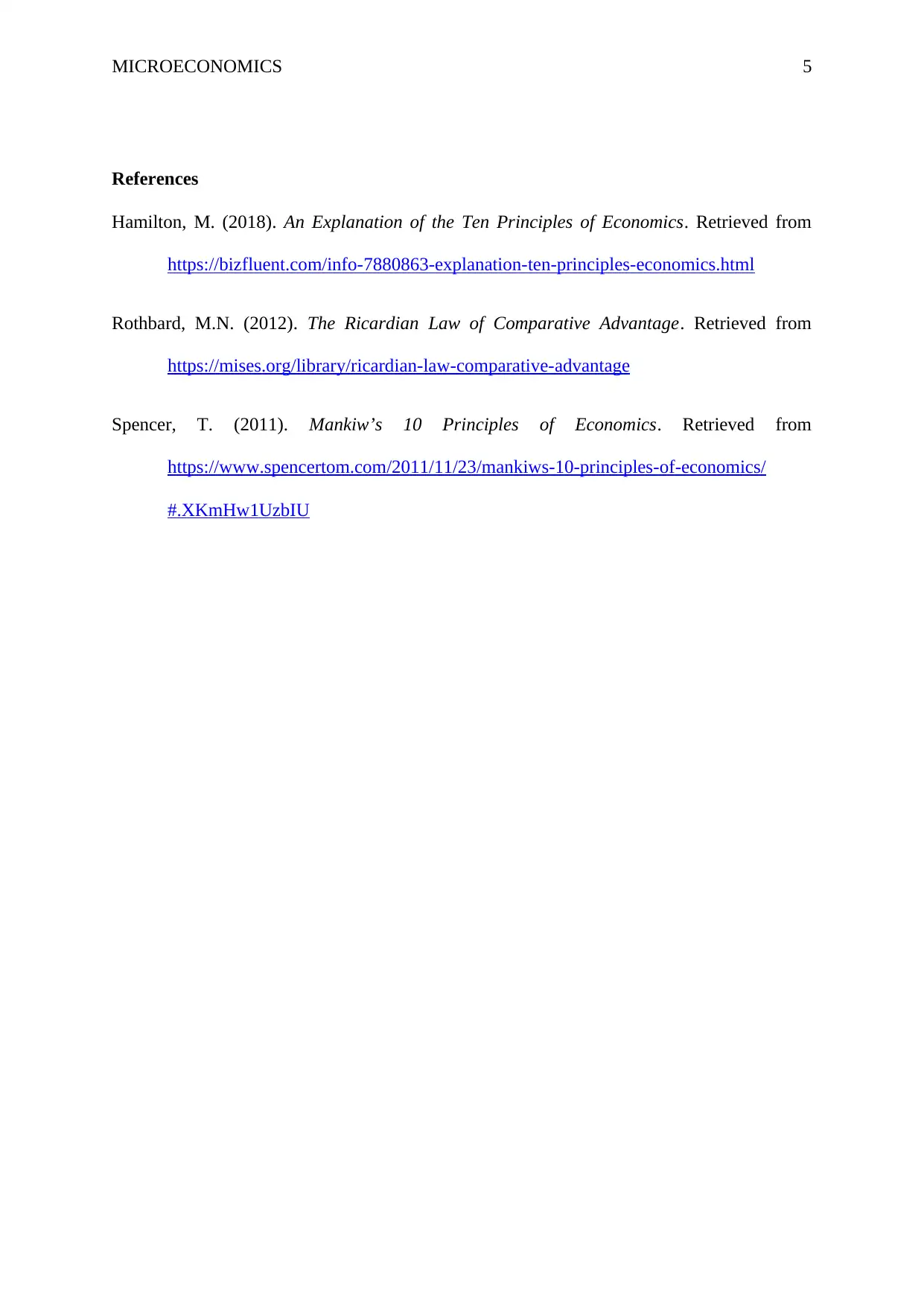
MICROECONOMICS 5
References
Hamilton, M. (2018). An Explanation of the Ten Principles of Economics. Retrieved from
https://bizfluent.com/info-7880863-explanation-ten-principles-economics.html
Rothbard, M.N. (2012). The Ricardian Law of Comparative Advantage. Retrieved from
https://mises.org/library/ricardian-law-comparative-advantage
Spencer, T. (2011). Mankiw’s 10 Principles of Economics. Retrieved from
https://www.spencertom.com/2011/11/23/mankiws-10-principles-of-economics/
#.XKmHw1UzbIU
References
Hamilton, M. (2018). An Explanation of the Ten Principles of Economics. Retrieved from
https://bizfluent.com/info-7880863-explanation-ten-principles-economics.html
Rothbard, M.N. (2012). The Ricardian Law of Comparative Advantage. Retrieved from
https://mises.org/library/ricardian-law-comparative-advantage
Spencer, T. (2011). Mankiw’s 10 Principles of Economics. Retrieved from
https://www.spencertom.com/2011/11/23/mankiws-10-principles-of-economics/
#.XKmHw1UzbIU
⊘ This is a preview!⊘
Do you want full access?
Subscribe today to unlock all pages.

Trusted by 1+ million students worldwide
1 out of 6
Related Documents
Your All-in-One AI-Powered Toolkit for Academic Success.
+13062052269
info@desklib.com
Available 24*7 on WhatsApp / Email
![[object Object]](/_next/static/media/star-bottom.7253800d.svg)
Unlock your academic potential
Copyright © 2020–2026 A2Z Services. All Rights Reserved. Developed and managed by ZUCOL.





